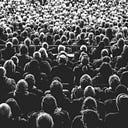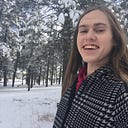My Embarrassing Lifelong Obsession With Blond Hair
I judged myself and everyone I knew based on our hair colors
--
For the first decade of my adult life, I’ve lived with less anxiety and relative freedom from the deep depression that overshadowed my teenage years. I attribute my good fortune to a transformative year of therapy (or technically, the Lefkoe Method) that I did during college.
However, one neurosis that did not end was my embarrassing obsession with blond hair. I still catch myself fixating on my yellowish-brown locks in the mirror for far too long. It’s prolonged the shadow of my former mental suffering.
One factor that inhibits healing, I’ve realized, is shame and secrecy. While confessing to my general insecurities has been easier, I’ve felt mortified to admit the full extent of my blond hair obsession and, especially, its racist underpinnings.
Writing this story is part of my recovery. I hope it helps anyone else out there who’s suffered over comparing your natural features to others. May we all get to experience ourselves and each other as uniquely beautiful.
Having blond hair became my self-esteem strategy.
One of the concepts I learned from the Lefkoe Method was survival strategies. As young children, we tend to internalize criticism or disappointment from others by feeling like we’re not good enough. Survival strategies are how we reassure ourselves that we’re actually okay!
During my upbringing, strategies I used to save my self-esteem were:
- seeming to be smart, talented, unique, or perfect
- having people think highly of me
- being blond and conforming to other beauty ideals
I developed a superiority/inferiority complex around blond hair.
I could easily understand why I’d been obsessed with intelligence, and approval-seeking. Adults praised my early displays of braininess. As a child, clung to that validation.
Tracing back my obsession with hair color, on the other hand, eluded me. I was disturbed by my participation in racism and I didn’t want to face it.
As blond children, my sisters and I got compliments on our flaxen heads. Elders who had once been blond probably saw it as a fleeting, enviable trait, like seeing a flowering plant in a rare stage of bloom.
Lots of stories seemed to be about blond princesses. Meanwhile, our history textbooks made whites the protagonists. Other colors were portrayed as unlucky, or as supporting cast members.
So in my mind, blond-haired pale people became the prettiest. This insinuated racism against whites with darker features and especially against people of color.
The blond bug started out as a superiority complex. Later, the inferiority complex emerged when my hair darkened.
I highlighted my hair, yet hypocritically judged others who did so as “fake.”
I remember the day someone told me my hair would eventually turn brown. I was horrified. Surely my follicles would never betray me so!
And the day my hair was first referred to as dirty blond.
By halfway through seventh grade, I had had enough of my increasingly matte, ashy shade of ex-golden. I complained to my mom, divulging my infatuation with the impeccable long blond tresses of some of my classmates.
Mom helped brush this magical potion called Sun-In through my hair. Thus began my first, furtive attempt at at-home highlights.
Of course, it’s not like I was going to give away that genetics had rudely revoked my natural blond card. When schoolmates enquired, I acted as if nothing had changed. What, suddenly three shades lighter? Since when?
I guess I’ve just been spending so much time in the sun!
The whole thing seems silly now. What should it matter whether one’s hair color is “real?” Hair looks how it looks. You can be content to keep it or decide to alter it. A naturally blond person is not more beautiful, pure, or blessed by the gods. Let’s celebrate the hair rainbow.
Yet, I judged other folks who dyed their hair, as if natural beauty were best and change was dishonest.
Watch out for racism on the internet.
As my web browsing increased, I found a possibly racist site that glamorized “born blonds.” The site suggested blonds were victims of stereotype and appropriation. It didn’t acknowledge the real or much worse racism against non-white people.
Fortunately, the “born blond” place was the only such site I remember browsing. Although I did spam-scroll the Wikipedia pages on different hair colors to stay obsessed. This piqued my interest in the countries where blond hair was the most prevalent. I irrationally wished I had more Scandinavian ancestry, as if German and British wasn’t blond enough.
My racism-fueled web browsing came to an end. But the fact I was once allured by those bad ideas never stopped feeling unsettling.
Growing long blond hair was how I expressed myself as a transgender teen.
Another reason I got “stuck” on hair? It was one of the few means by which I could express myself as a secret trans girl.
I passionately loathed having to wear boy clothes. I tried to end up with the least baggy, shortest shorts possible or just opted for neutral-looking jeans with a T-shirt. Though I couldn’t wear girl clothes and kept my gender dysphoria to myself, having long hair was one of the few ways I got away with baring my femininity.
By senior year of high school, my hair had completely grown out to its natural dishwater color. Then one day, I snuck a bottle of lemon juice into the bathroom and brushed it through. It actually came out looking quite good, except for the frizz and tangles.
My hair issues were wrapped up with my gendered journey, and that made them more complicated to let go of. Today, the 27-year-old me tries to remind my inner teen that I have other ways of feeling beautiful and womanly besides just my hair!
Watching movies made my obsession with blond hair worse.
Around that time in high school, I grew attached to a beautiful movie star. She had doll-like features and her long blond hair always looked “perfect” and “so natural.”
Now I could stand in front of the mirror for 30 minutes after watching one of her films and try to convince myself my lemony locks looked somewhat like hers.
In reality, my favorite movie star’s fluctuating roots revealed that she, too, had naturally dull blond or mousy brown hair. Her hair either got lightened on purpose or by accident, which I’ve learned can easily happen because so many regular hair products contain salt, we swim in the ocean, et cetera.
But when I saw those movie scenes of the actress singing in the sun, every nuanced shimmer in her styled, wavy blond hair rippling in the wind like a nature-made strand of art, I became obsessed. I felt like all I wanted was to look like her and sing like her. I felt like a hypnotized fan at a magic show who can’t see past the illusion of the stage tricks.
As I neared my twenties, my hairline showed its first signs of recession. My blondness obsession thereby got transferred to an anti-baldness campaign.
This other dimension of my hair neuroticism brought up additional ugly prejudices.
I fell for the ageism of airbrushed media, where the young and the full heads of hair are glamorized.
Plus, I was sexistly thinking that women were better than men due to lacking male pattern baldness, while at the same time objectifying women and thinking their self-worth = their beauty. To everyone, I am sorry.
To this day, I’m on and off in my hair neuroticism.
Since my first highlights at age 12, the pattern has mostly looked like this:
- I let my roots grow out. I forget about blondness for a while, which gives me peace of mind, although I eventually feel less sexy.
- My hair becomes too brown to bear, and I begin idolizing others’ blondness again. I guiltily shower with a bottle of chamomile or lemon shampoo.
- At first, the change is exciting. Then, I stare at my highlights a lot and freak out because I decide they’re too streaky and unnatural-looking. I’ve once again “ruined” my hair. I keep obsessing and vacillating between pride and humiliation.
- Until finally, it gets to be too much. I stop staring at my hair and start avoiding the mirror. I go back to feeling perpetually peripherally dissatisfied with the way I look, resigned to my perceived incurable ugliness as a person of imperfect, thinning, not-naturally-blond-anymore hair.
How am I healing from my obsession with blond hair?
I know it’s natural to want to look as appealing as possible, and maybe there is something eye-catching about blond hair. Yet my obsession has been over-the-top. Distraction over the one detail (my hair color) takes away from my pursuit of holistic health and inner beauty.
Here are 6 things I have been doing to heal:
- I’m listening to other people’s hair struggles. Especially those of non-white or people of color, which put my privileged angst into perspective.
The Duolingo Spanish podcast had on Cirle Tatis Arzuza, a black Colombian woman who grew up being taught her curly hair was bad. She suffered through harsh chemical treatments that led to major hair loss, before finally embracing her natural hair beauty. She became a hairstylist who spreads awareness with her YouTube channel “Pelo Bueno.”
Here are a few more stories I loved:
I Wanted To Be a Blond Girl So Bad
I felt outcasted for looking different than other girls.
medium.com
2. I meditated recently on that favorite blond actress I used to watch. I apologized for having equated her to her looks, and I told her what I appreciated about her on the inside. Now when old obsessive thoughts arise, they can loop back to the soothing memory of that conversation I imagined myself having with her. I feel better automatically.
3. I do another exercise, where I talk to my body as if it were its own being. I wouldn’t want to reduce anyone’s worth to a single attribute, so I can’t objectify my body either. I compliment each of my body parts on their beauty, and on the amazing functions that they fulfill. I communicate with my hair as if it were a child whom I’ve mistreated and am learning to truly love.
4. I forgive myself. Everyone is vulnerable to developing insecurities, which they then feed with prejudiced ideas. I try to be self-compassionate, as I would be with a friend.
5. I’m unlearning the perception that beauty is a prize for me to hoard. Instead, beauty is a gift we give to each other. Being beautiful in my own way is about sharing joy with you, rather than maximizing my own satisfaction with how I look in the mirror.
6. I’m finally telling my story. Writing and knowing you’ll read it relieves pressure I’ve felt around my blond hair obsession.
I really hope reading these honest words has been to your benefit as well. Whatever body image struggles you may have experienced, you are more than good enough, hair or no hair. And you a beautiful person!

